If you want to evict the Food Giants from your life, pretend you’re Italian: Part 2
Toolkit for being more Italian about things, when you don’t want to cook Italian food.
Being more Italian in the kitchen is an attitude, not a never-ending bowl of spaghetti. This is how you go about Italianising your kitchen whatever you want to cook.
Sort out your food palette
One of the things that makes Italian food so doable – even in a really busy life – is it has a clear palette of ingredients and flavours, so you don’t have use up stressed-out brain space finding or thinking about what you‘re going to use.
The basic palette would look something like this:
olive oil, balsamic vinegar, salt and pepper, garlic, pepperoncino (chilli); Parmesan; parsley, basil, rosemary, thyme and sage – you could include the odd bay leaf; olives, capers, and anchovy;
And it takes care of almost all the cooking and flavouring needs of pretty much anything you are likely to cook – pasta, rice, pulses, meat, fish – and means you can conjure up something absolutely delicious in less time than it takes to scroll down the Deliveroo menu.
There are also some core vegetables: tomatoes, onion, celery, carrot, aubergine, courgette, spinach, fennel, lemons, and salad leaves which are regular visitors to the Italian table.
Yes, I know that tomatoes and lemons are fruit, but they don’t like to be left out.
Italians are not multicultural in their cooking habits – I won’t go into details, but they don’t have a high opinion of other nations’ food – so they don’t complicate things with trying to fit the whole world into their larder.
Here in England – where we have fallen on the food of other cultures* with ravening taste buds – things are more complicated.
*This is hardly surprising. It might seem glib to suggest that our empire building days were just a desperate attempt to get away from a life of suet, but if you’ve never eaten suet, you should not mock until you have.
I am exaggerating the terribleness of English food: there are some delicious English dishes – and I have a wonderful book, British Cookery by Lizzie Boyd to prove it – but when I was growing up, it would have been a reasonable assumption that absolutely nobody knew what they were or how to cook them. Apart from bread sauce, which is food to the gods. And my mother’s trifle, which was a thing of utter wonder – but as that involved homemade sponge cake, homemade macaroons, homemade jam, homemade real egg custard, and a vast amount of sherry and cream, you shouldn’t even consider it without at least two sous-chefs and an under-scullery-maid.
Because of all this, our food palettes are much more fragmented, but we all have food that we love and eat all the time, which will have its own cache of ingredients.
For example, when I’m in Italy, I mostly cook Italian food, but in London, I eat my other passion, Middle Eastern and North African food, so my palette looks something like this: olive oil, balsamic vinegar (which is an intruder), honey, salt and pepper, garlic, chilli; parsley, coriander, thyme, rosemary; lemons, yogurt, tahini; coriander seeds, cardamom and cumin. And pomegranate seeds, which I use like salt and pepper.
Neither of these palettes are anything like exhaustive, and I am English so can lay claim to unbounded enthusiasm, but zero authenticity.
So the first part of getting your palette into usable order, is look at what you mostly cook, and what ingredients you use to cook it.
The second part is that your palette needs to be close at hand – you don’t want grab your knife and chopping board, only to find your ingredients scattered in six different cupboards … on the garage roof. Everything I use regularly is within arm’s reach of my worktop; everything else can live where it pleases, although not on the garage roof.
I do not have a garage.
The Giant-Slaying Fridge
The best way of cooking from scratch and never need to resort to giantish nonsense is to plan – meal plans, shopping lists, batch-cooking – but I am not really the planning sort.*
* Which is like saying that a lion is not really a vegetarian.
So the next best thing is to make sure I always have things in the fridge: if you open the door, and empty, gleaming glass shelves stare back at you, it’s pretty hard to throw something delicious together for supper: the Food Giants rely on empty fridges to keep them in business.
I keep mine stuffed to the gunnels with vegetables.
And vegetables I actually like, rather than the ones I think I ought to like.
And I try and keep the ones I do like, but hate having to prepare – celeriac, you know who you are – to a minimum, to avoid them glaring balefully at me while they shrivel and moulder into dust.
In particular, I am of the opinion that civilised life could end abruptly if I don’t have cauliflower or cabbage – and preferably both: the full gamut of the things I like to do to to a cabbage needs a chapter of its own, but it starts with chopping it up roughly and sprinkling salt and drizzling olive oil over it for an emergency lunch, and continues roasting it, steam sautéing it with ginger and garlic, and then on to the 455,000 types of slaw you can make with it.
Like this one:
Red cabbage slaw with mango, chilli, and pomegranate seeds
The other things that I always keep in the fridge are lemons (Amalfi, unwaxed if the gods are being kind) and pomegranate seeds, unless the sky has fallen in.
The gunnels not stuffed with vegetables contain fruit – I eat it a lot instead of cake or pudding, and use it all the time in salads.
I also keep cooked pulses, because with the addition of any of the vegetables in the fridge – raw or roasted, hot or cold, they can make a ravishing supper in a few minutes.
Lentils with cumin-roast beetroot, lemon kumquat, black olives, and pomegranate seeds.
In the corners not taken over with vegetable matter, I make sure there is chicken or fish – and sometimes grass-fed beef or lamb; as often as possible I include a fillet of my own gin-cured salmon which I particularly like eating for breakfast.
Eggs
I always, always keep eggs in my fridge. There are hens out there who feel their entire, free-range lives are dedicated to providing me with breakfast. They don’t need to know that they are often deeply involved in my lunch or supper, because apart from the fact that I come from egg-eating stock – my mother believed that her life had no meaning unless she ate eggs for breakfast every single day – they are one of the worlds fastest fast-foods: my daily breakfast omelette takes one minute, including breaking and whisking the eggs, heating the pan, and cooking it. Take that, Coco Pops.
Giant-slaying omelette
Heat up an iron pan with a splash of olive oil till a fraction of a second before the smoke alarm goes off.
Break two eggs in a bowl, season well with salt and pepper, and whisk enthusiastically.
Pour it into the very hot pan and watch it bubble for a few seconds. You might want to push the sides in, to bring raw egg into contact with the hot pan. Or you might not.
When some, but not all the egg is cooked, fold it over and take it out of the pan immediately and put on a plate.
Dive Notes
I always use my Netherton Foundry spun iron prospector pan, but other pans are available. If you use a non-stick pan don’t heat it too hot.
And when not making omelettes, there’s fried eggs, scrambled eggs, baked eggs, poached eggs, and I will never be too grown up to eat boiled egg and soldiers. Plus all the gorgeous things you can do with hard boiled eggs.
Dressings and the art of not doing them
This was in last week’s Downsizing Diva, but it belongs in the chapter so I’m including it again
Nowhere is pretending to be Italian more helpful to getting dinner on the table, than when it comes to dressings. When I was training at Leith’s, the only dressing that went on a salad was French – oil, vinegar, mustard, salt and pepper. Since then they’ve gone nuclear, with complicated concoctions of ingredients that at the very least, will involve half an hour of scrabbling in the back of your store cupboard, and in all probability a fully equipped expedition up the Amazon – the river, not the one that claims to have handed your parcel to a neighbour. It’s fun if you’ve got the time, and you’re in the mood for it, but it’s neither relaxing nor necessary.




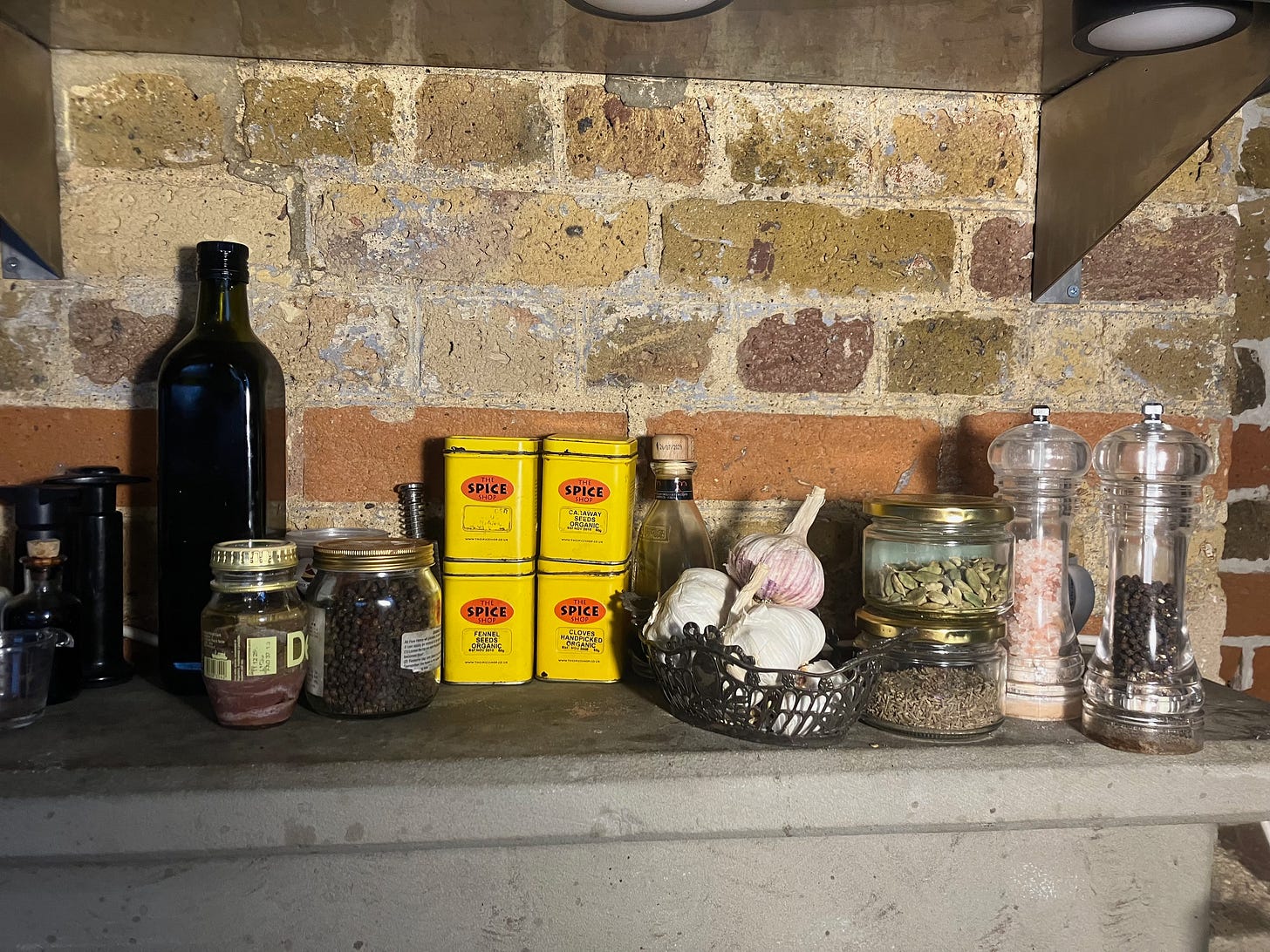
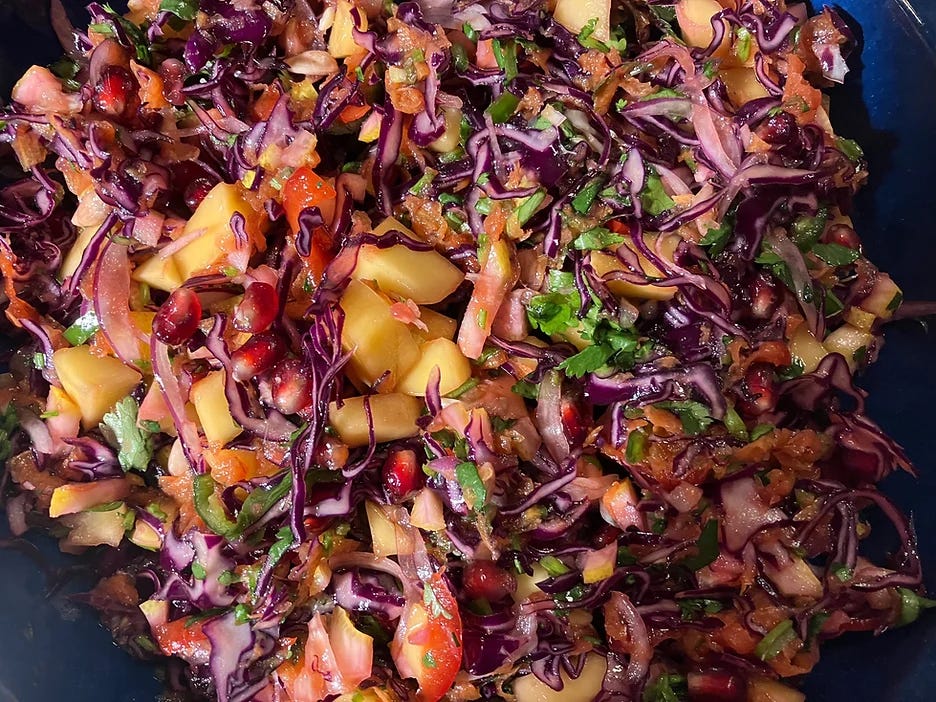
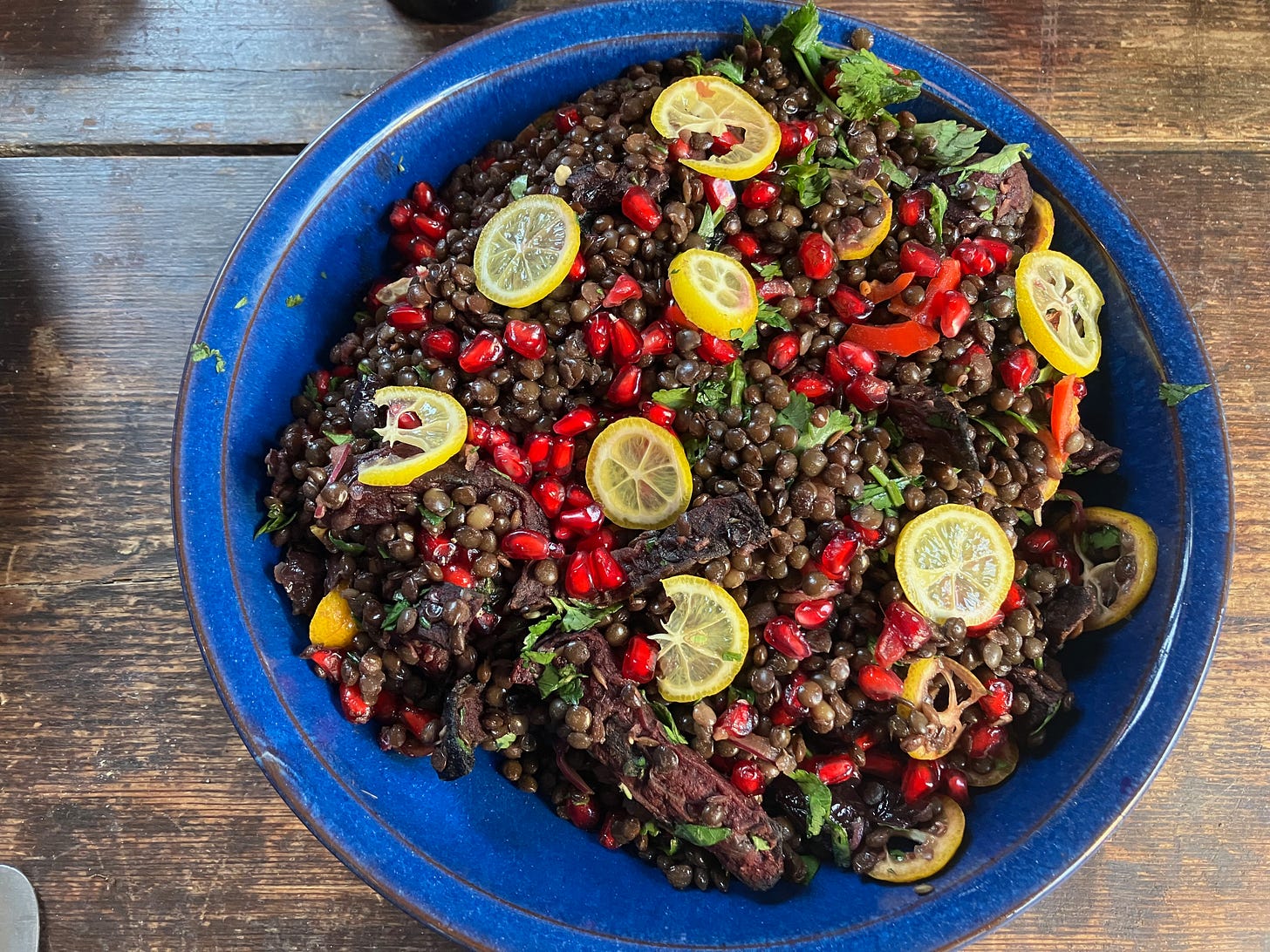
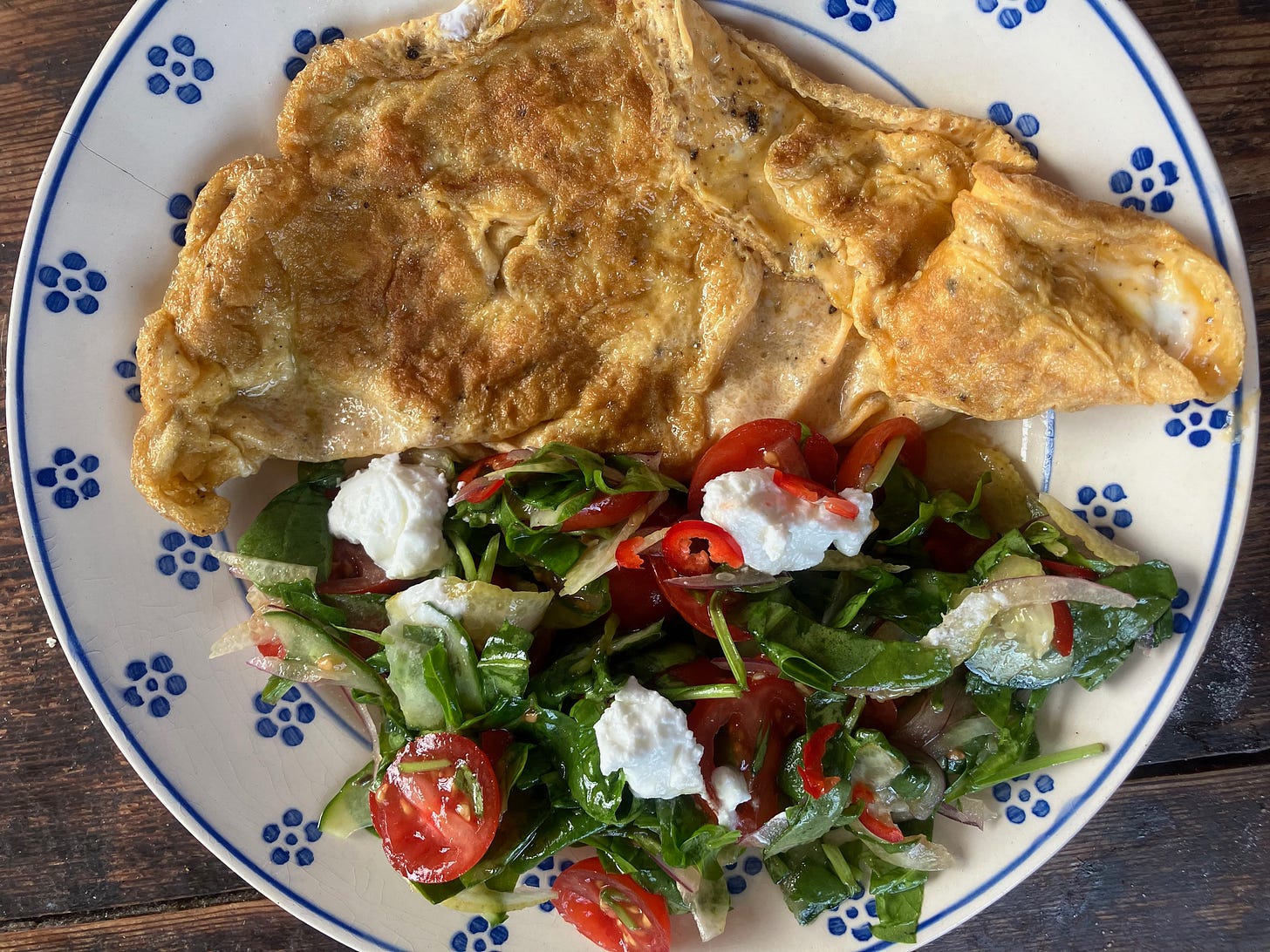
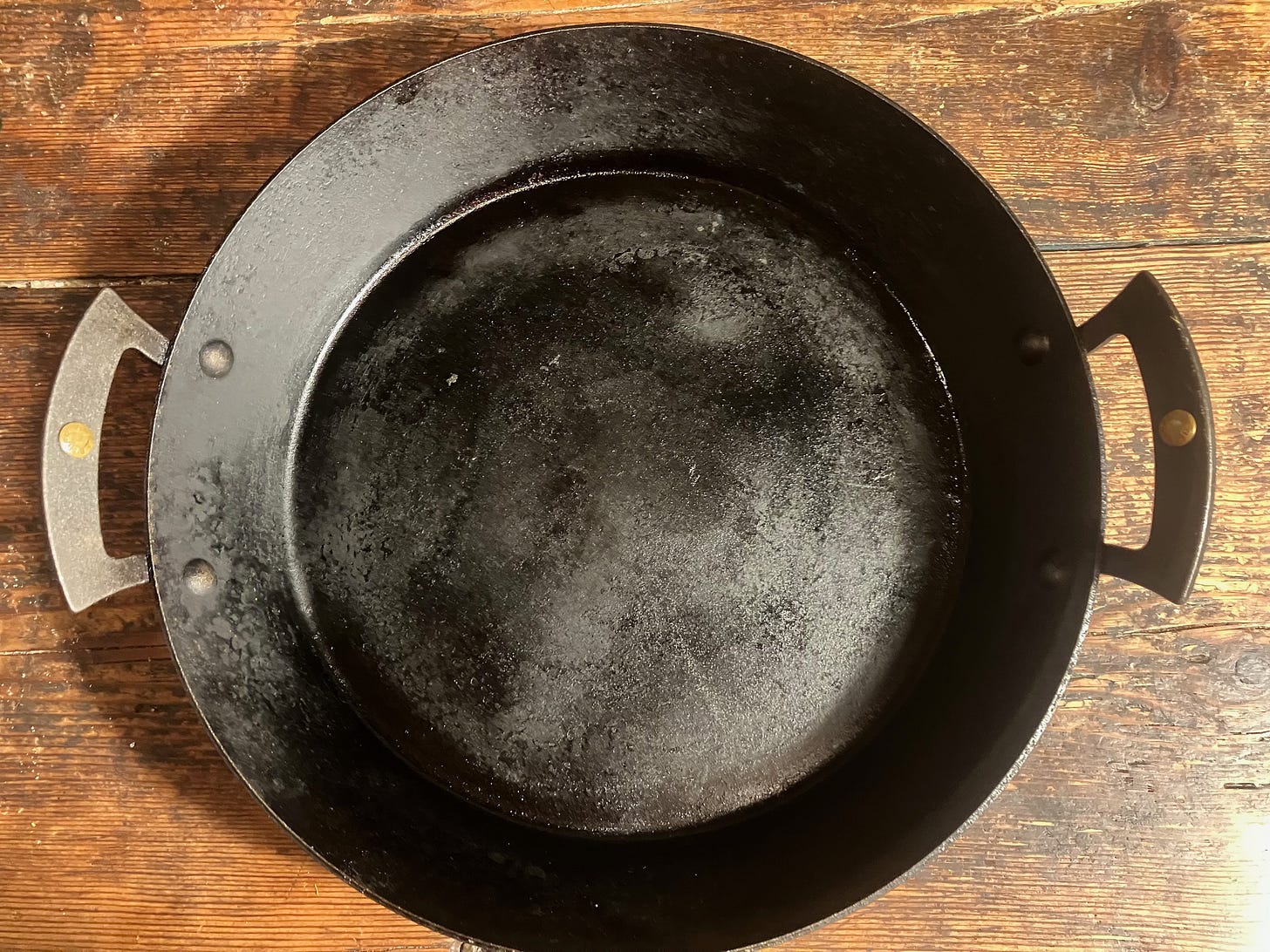
Great ideas and even though it’s common sense, sometimes when people get busy they don’t think so well!! My only other comment would be that eggs should really be cooked in butter for optimum flavour! 😊
Great suggestions as always Lizzie. And also thanks for the heads up on your spun iron pan. I’ve not heard of spun iron before but sounds like a much better alternative than cast iron which is way too heavy for me these days. ❤️